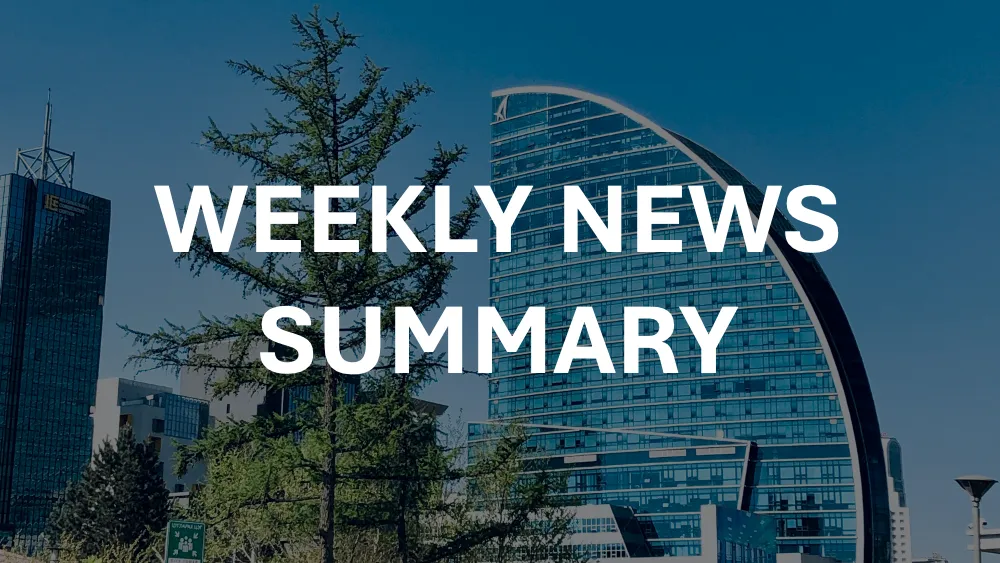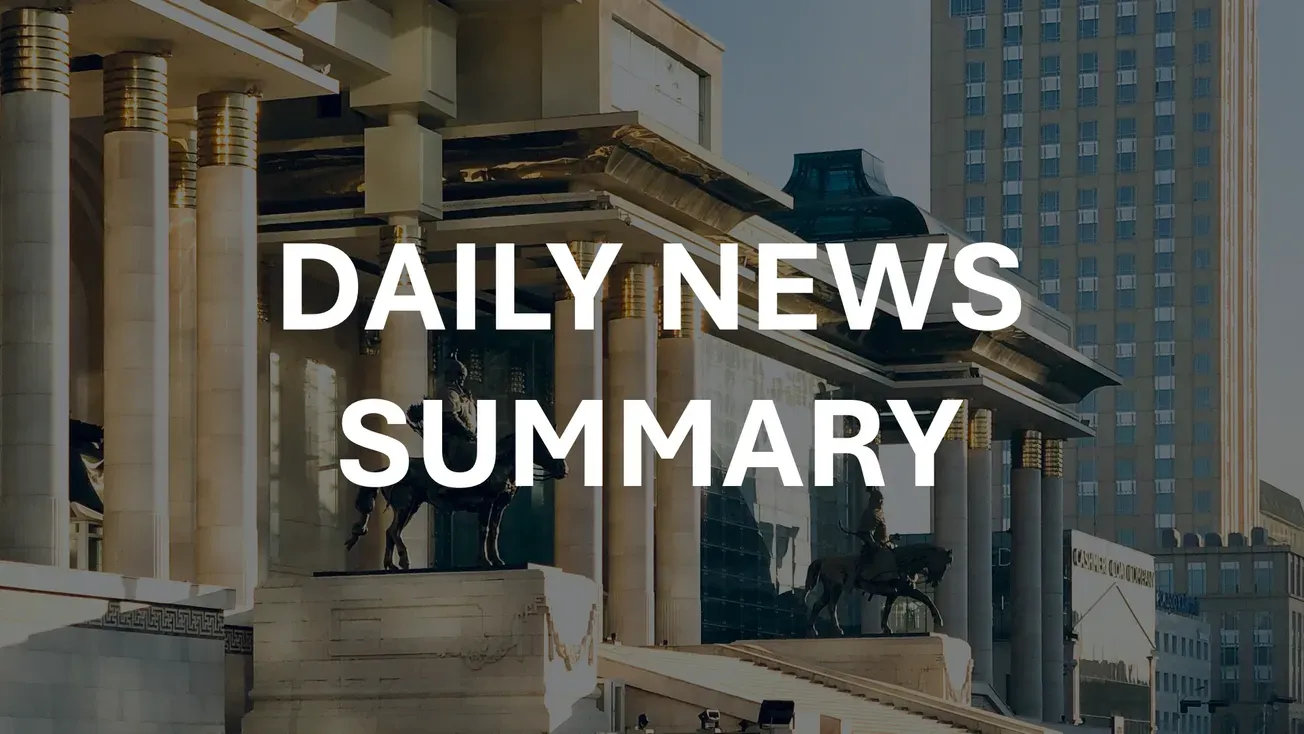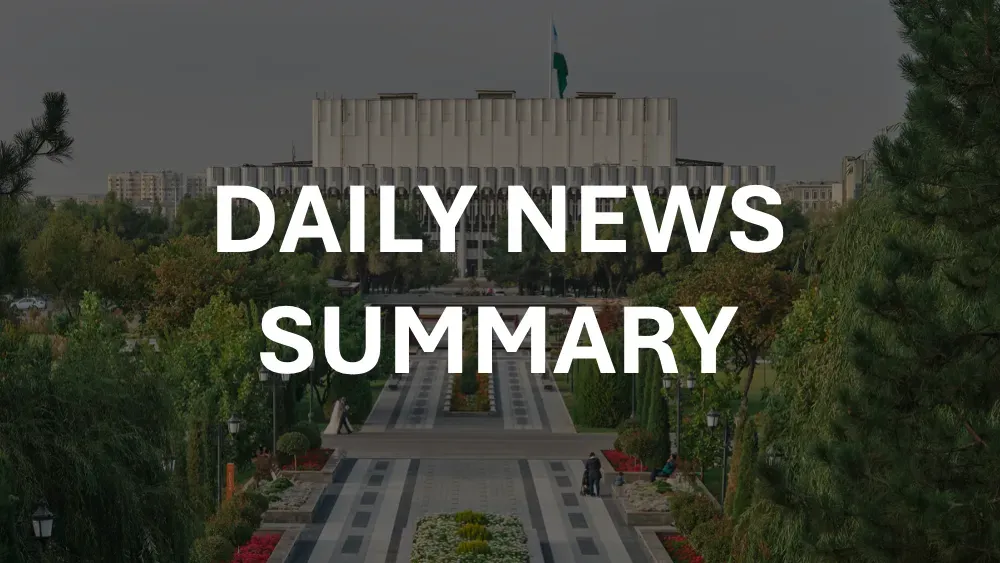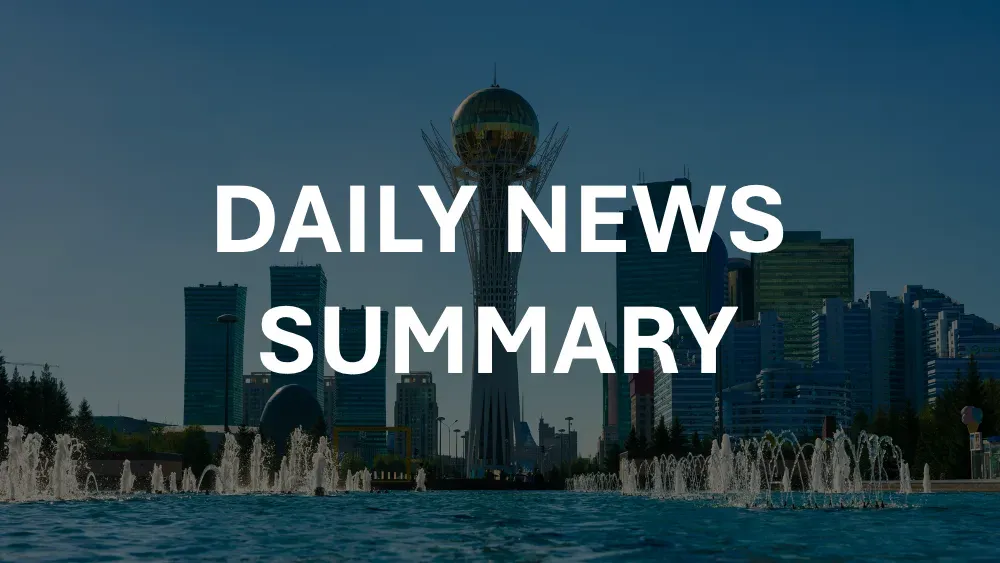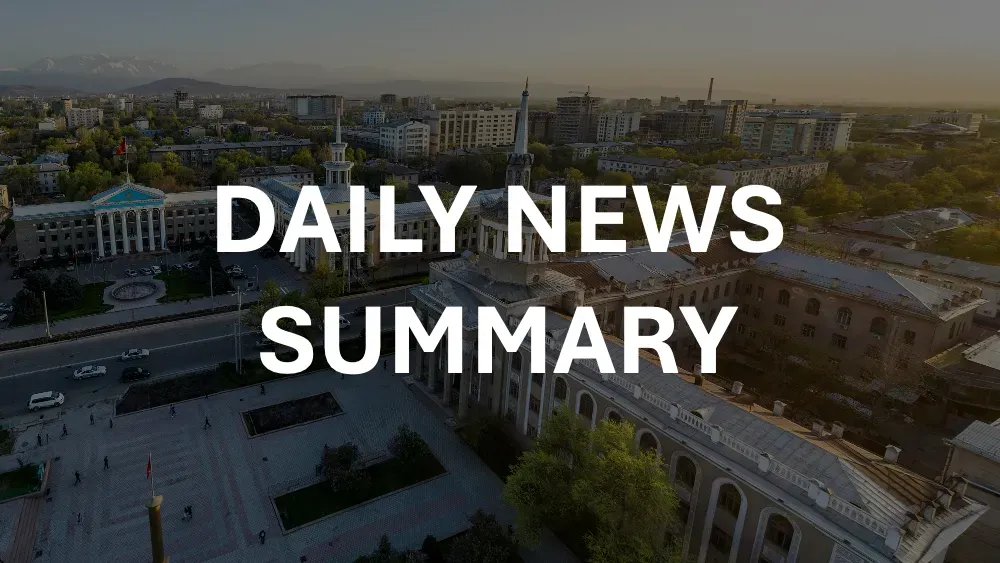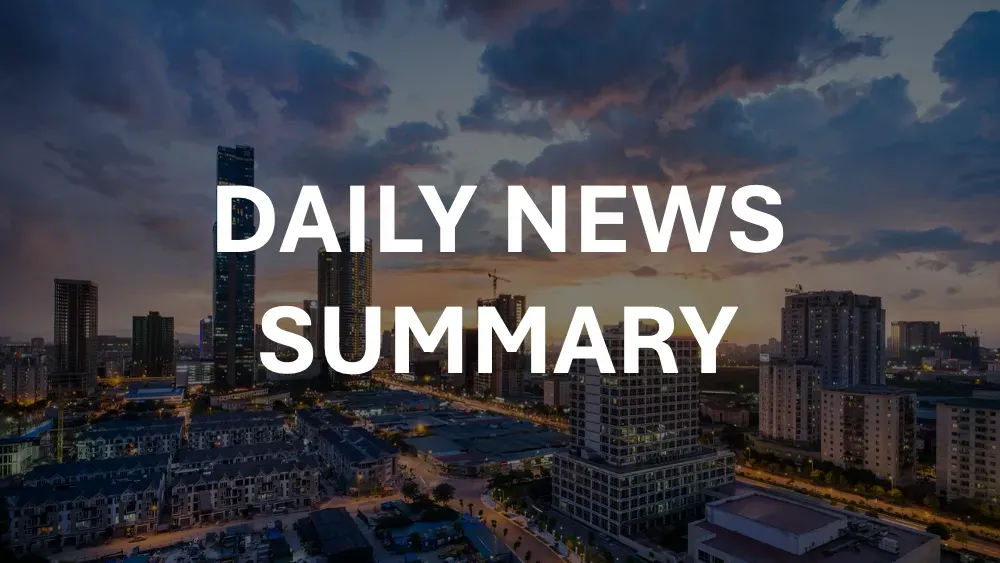July 27, 2025 to August 2, 2025
This week's top 10 stories from Mongolia, selected from our daily intelligence briefs.
Ready for real-time intelligence? Start your free daily trial now.
1. Mongolia's Visit Proclaims Its Economic Gateway in Central Asia and Eurasia
Mongolia, under President U. Khurelsukh’s strategic foreign policy, is positioning itself as a key economic gateway in Central Asia and Eurasia through strengthened ties with Kyrgyzstan and Tajikistan. Recent state visits culminated in Mongolia elevating its relationship with Kyrgyzstan to a Comprehensive Partnership, marked by the signing of 14 legal documents and a joint declaration emphasizing cooperation in transport, mining, and agriculture. Notably, the two countries agreed to establish a joint Mongolian-Kyrgyz brand focused on value-added wool products and livestock trade, while also enhancing cultural and scientific exchanges. Concurrently, Mongolia signed 11 cooperation agreements with Tajikistan, a country advancing the Rogun hydropower plant—Central Asia’s largest energy project—offering a potential model for Mongolia’s nascent hydropower ambitions.
These developments follow Mongolia’s recent interim free trade agreement with the Eurasian Economic Union and reflect a nuanced, multi-pillar foreign policy that balances relations with Russia, the West, and regional partners without aligning exclusively with any bloc. President Khurelsukh’s approach underscores Mongolia’s intent to leverage its geographic position and economic potential while maintaining an independent, peace-oriented stance. With upcoming international engagements, including a visit to India and hosting global women’s leadership summits, Mongolia is enhancing its diplomatic profile and economic integration within Eurasia, signaling growing influence among landlocked, developing nations.
From daily brief: 2025-07-29
2. Minister N. Uchral Meets with Chinese Premier Li Qiang
Deputy Prime Minister and Minister of Economy and Development N. Uchral attended the World Artificial Intelligence Conference in Shanghai, China, where he met with Chinese Premier Li Qiang. The conference, held annually since 2018, gathers over 1,000 global representatives from government, industry, academia, and international organizations to discuss advancements in artificial intelligence. This year’s event, themed "Era of Artificial Intelligence – Global Unity," underscores the growing importance of international collaboration in AI development and policy.
During the conference, Uchral and Premier Li jointly visited the Artificial Intelligence Expo, highlighting the strategic priority both countries place on AI innovation and cooperation. Their engagement at this leading global forum signals potential avenues for enhanced bilateral partnerships in technology and economic development amid the rapidly evolving AI landscape.
From daily brief: 2025-07-26
3. Has the Cost of Bribing a Parliamentarian by the Government Reached 15 Billion MNT?
Mongolia’s government faces allegations of using district-level budget allocations as a means to bribe Members of Parliament (MPs), with reports indicating that each of the 78 district-elected MPs is being allocated investment proposals worth 15 billion MNT (approximately $4.8 million) ahead of the 2026 budget submission deadline. This practice, revealed by MPs M. Narantuya-Nara of the Civil Will Green Party and Kh. Baasanjargal of the Mongolian People’s Party, contradicts official statements denying the existence of a “district budget.” Historically, district budgets began in the 2000s with allocations starting at 10 million MNT and have escalated under successive governments, reaching a record high under the current Zandanshatar administration. The timing is notable given Mongolia’s current fiscal challenges, including a 1 trillion MNT budget deficit and a $2.5 billion drop in coal export revenue, raising concerns about transparency and governance amid efforts to secure political support within parliament.
From daily brief: 2025-07-25
4. The US Dollar Exchange Rate Continues to Rise, Surpassing 3600 Tugriks
The Mongolian tugrik has continued to depreciate against the US dollar, surpassing 3,600 tugriks per dollar in informal markets, with official rates at 3,587 tugriks as of yesterday, up from 3,400 at the end of 2024. This trend reflects underlying economic pressures including a trade deficit, reduced investment and aid inflows, and declining foreign currency reserves. The gap between official and unofficial exchange rates has widened to 15-23 tugriks, driven by increased demand for foreign currency amid rising dollar deposits, budget deficits, and seasonal import activity.
Bank of Mongolia officials acknowledge significant depreciation pressure in early 2025 but anticipate easing as the balance of payments deficit narrows and the US dollar weakens internationally. The central bank plans to intervene to stabilize the market and mitigate volatility. Nonetheless, experts emphasize that the trajectory of the tugrik will depend heavily on the central bank’s responsiveness to evolving market conditions and external factors, underscoring the need for vigilant monetary policy to maintain exchange rate stability in the coming months.
From daily brief: 2025-07-31
5. Minister of Digital Development and Communications E. Batshugar meets with World Bank’s Resident Representative in Mongolia Taehyun Lee
Minister of Digital Development, Innovation, and Communications of Mongolia, E. Batshugar, recently met with Taehyun Lee, the World Bank’s resident representative in Mongolia since 2023, to discuss ongoing collaboration in the ICT sector. Central to their cooperation is the "Smart Governance-2" project (2023–2027), funded by a concessional loan from the World Bank’s International Development Association. This initiative aims to enhance Mongolia’s digital infrastructure through the establishment of national cloud and disaster recovery data centers, improved cybersecurity capabilities, and expanded digital signature systems aligned with international standards.
The project also focuses on modernizing the KHUR information exchange system, providing digital literacy training to 10,000 citizens, and creating 3,000 jobs in digital technology. Additionally, it seeks to bolster the digital capacities of small and medium-sized enterprises to stimulate growth in digital services and trade. These measures are expected to significantly advance Mongolia’s digital governance framework and economic competitiveness in the regional digital economy.
From daily brief: 2025-07-31
6. VAT to be Imposed on Foreign Legal Entities Providing Electronic Services
The Mongolian government is preparing a draft amendment to the Value Added Tax (VAT) law that will impose VAT on electronic and remote services provided by foreign legal entities operating within Mongolia. Under the proposed regulation, non-resident service providers generating annual sales revenue of 400 million MNT or more from Mongolian customers will be registered as withholding taxpayers. This includes major international online platforms such as Meta, Google, and Netflix, as well as providers of video streaming, advertising, and software services. The amendment aims to enhance tax revenue collection from the digital economy while promoting fair competition between domestic and foreign service providers.
By targeting foreign entities delivering digital services remotely, Mongolia seeks to modernize its tax framework in line with global trends addressing the challenges of taxing cross-border e-services. The measure is expected to significantly increase VAT revenues and improve tax policy effectiveness in the evolving digital market, ensuring that foreign digital service providers contribute equitably to the local tax base.
From daily brief: 2025-07-30
7. Emphasis on Strengthening Russia-Mongolia Parliamentary Cooperation
During a meeting in Geneva ahead of the 6th Conference of Parliamentary Speakers, Federation Council Chairperson Valentina Matvienko and Mongolian Parliament Speaker Dashzegviin Amarbaysgalan emphasized the need to strengthen parliamentary cooperation between Russia and Mongolia. Matvienko proposed that the cooperation commission, led by Russian Deputy Chair Konstantin Kosachev, and associated friendship groups jointly develop a two-year cooperation plan to facilitate legislative exchanges and mutual parliamentary visits. She highlighted existing productive collaboration within international forums such as the Asia-Pacific Parliamentary Forum and the Asian Parliamentary Assembly, and expressed hope for enhanced engagement within the SCO and EAEU frameworks.
Matvienko also underscored the importance of fostering ties between young parliamentarians as a promising avenue for deepening bilateral relations. The Federation Council’s special group on Mongolian relations, headed by Senator Ilyas Umakhanov, plays a key role in coordinating these efforts. This strategic focus reflects both countries’ intent to leverage parliamentary diplomacy to support broader regional integration and legislative alignment.
From daily brief: 2025-07-29
8. Mongolia-Japan Business Meeting Held in Osaka Kansai
On July 27, 2025, the Mongolian National Chamber of Commerce and Industry, led by President B. Lkhagvajav, hosted a Mongolia-Japan business meeting in Osaka Kansai, coinciding with the 2025 World Expo. The event, attended by over 200 business professionals, was co-organized with key Japanese institutions including the Osaka Chamber of Commerce and Industry, JETRO, and the Osaka SME Support Agency. It aimed to foster new business agreements and enhance bilateral cultural understanding.
A significant outcome was the signing of a memorandum of understanding between the Mongolian and Osaka Chambers of Commerce, represented by B. Lkhagvajav and Shingo Torii respectively, to deepen economic cooperation. The agreement commits both parties to exchange information and collaborate on future trade and investment forums, exhibitions, and fairs, signaling a strategic effort to strengthen Mongolia-Japan commercial ties amid the global spotlight of the Osaka-Kansai Expo.
From daily brief: 2025-07-28
9. Signed a Project to Reduce Air Pollution and Traffic Congestion
The Ulaanbaatar city administration has partnered with UK-based company Skyral to launch a $1.7 million pilot project aimed at reducing air pollution and traffic congestion through advanced AI technology. Signed on July 17, the initiative will utilize Skyral’s “Digital Twin” platform to model the city’s road traffic, identify congestion causes, and develop intelligent solutions. This innovative approach positions Mongolia among the few countries adopting digital tools to tackle urban mobility and environmental challenges simultaneously. Skyral estimates that between 2025 and 2030, the project could reduce Ulaanbaatar’s economic losses from traffic-related issues by $240–520 million annually, while improving public health and aligning with the city’s “20-minute city” urban development concept to enhance accessibility to essential services.
From daily brief: 2025-07-27
10. Inspection and Audit of Customs and Border Checkpoints Operations Commence
The Government Monitoring and Implementation Agency has initiated a 14-day inspection and audit of the General Customs Office and related entities, following a directive from Prime Minister G. Zandanshatar’s task force aimed at boosting exports and trade. The review will assess customs border procedures, regulatory compliance, coal-related sampling and assessments, as well as the functionality of smart gate infrastructure and the automated clearance system at selected checkpoints. B. Batsetseg, head of the agency, emphasized that the audit seeks to reduce bureaucratic inefficiencies, delays, and economic losses affecting businesses and citizens, with legal accountability for individual misconduct and a focus on systemic improvements.
The findings will be submitted to the task force for further action, signaling a government commitment to streamline customs operations and enhance trade facilitation. Stakeholders are invited to contribute feedback via [email protected], highlighting an inclusive approach to reform. This initiative reflects Mongolia’s strategic effort to modernize border management and support economic growth through improved export processes.
From daily brief: 2025-07-25
This weekly digest is compiled from our daily Mongolia intelligence briefs. For daily coverage and analysis, upgrade your subscription.
